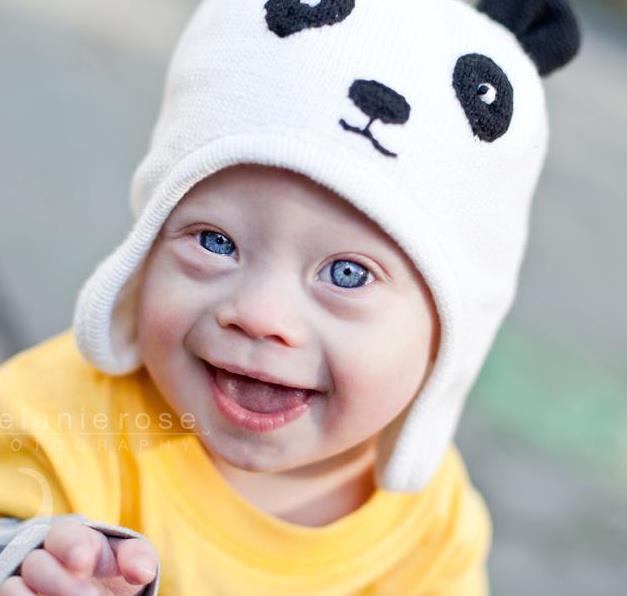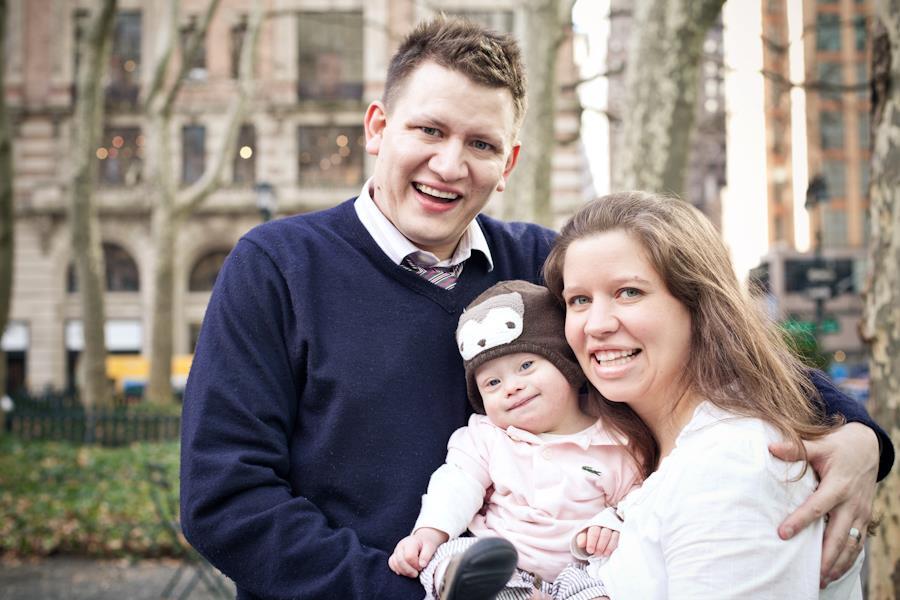
Sharing Noah's Story
Posted January 26, 2012 at 7:00 pm
By Nicole Forgione, Contributor
When I was asked to do this week’s blog, I did not know what to write about at first, but a thought quickly came to mind. Since I manage the Facebook pages for People Inc. (www.facebook.com/peopleinc) and the Museum of disABILITY History (www.facebook.com/museumofdisability), it was brought to my attention the many national stories that were recently in the news about a young boy with Down syndrome who was in a Target ad. The news featured Rick Smith of NoahsDad.com who blogged about this story. I found many news articles and started to follow NoahsDad even more closely for our Facebook pages. Rick blogs about Down syndrome and the videos, images and facts that tell the birth story of his and his wife’s son.
Blogs about Down syndrome
Birth Story
Down syndrome
I had the distinct pleasure to do a phone interview with Rick Smith, who lives in Dallas, Texas with his wife Abbie and their son Noah, 13 months old. During the interview, I personally felt inspired, laughed, and got teary eyed, but more importantly understood the message that every person has a story to share. Here is just part of that story that is filled with love and support by Rick and Abbie for their son Noah.

Why did you start NoahsDad.com?
We found out four hours after he was born that Noah was born with Down syndrome. The first words from the OB/GYN were ‘I'm sorry’ and anti-depressants were offered. It was made out to be that the story of our family would be painted sad. When we got home, I looked for research online and it was hard to find – the information was not current and accurate.
We realized that our story was not a sad story – it was okay and a different story. Through research, I found that nine out of 10 who are found to have Down syndrome in prenatal testing are aborted. That means every time you see one Noah, there are nine Noahs that you don’t see.
Parents are scared. Life is not all that sad. My wife Abbie and I wanted to give more of an accurate view of what life is like who has a child with Down syndrome. Our daily one-minute videos and blog articles share parts of our life with Noah.
What type of reaction did you receive initially from family and friends when you started NoahsDad.com?
From the moment we started, the response was overwhelming. We also had a response internationally and people would say they wished they lived in America so their children were not shunned and more medical services were available.
My wife is an emergency room physician and she wrote a guide for parents, including information like what five things you should ask your pediatrician.
The attention to our blog and Facebook page is overwhelming as well. Over the past week, our Facebook page went from 1,500 likes to more than 11,000.
With balancing family time and work life, how much time do you spend on your blog posts and social media sites?
At first, it was not nearly as involved, but now it is several hours a day with shooting video, editing and writing. It has been so overwhelming – we have not been able to respond to each post. We do read every post and every email because it is important and a privilege to us.
In addition to being a support network to families who have a loved one with Down syndrome or other disabilities, do you think your blog posts help people who do not have a connection to Down syndrome or other disabilities become more aware and sensitive to issues?
We really want to connect. We started the site originally for parents who did not have information, but we have gotten information from people all over the world about all types of disabilities. We want to help raise people’s voices, learn and connect. Now, thousands of parents share their personal family photos on our Facebook page.
Do you receive negative feedback or criticism from the public on your posts or your mission, and if so, how do you handle that?
I’m learning how to handle criticism. For one negative, you can have a thousand positives. I would do an interview with anyone about children with Down syndrome – even a publication called ‘hate children with....’ It does not mean that you endorse everything that publication stands for. I recently did an interview with Time Magazine, but that does not mean I believe in everything it says.
Do you have a “mantra” that you or your family live by?
Not really – we want to love God and people the best we can. All children are worthy of acceptance. A 15-year-old boy wrote to us and shared that he and other friends would make fun of a boy who had Down syndrome on their bus. He said he was going to stop and that he felt badly about that.
Recently, there has been much attention to the advertisements that included a 6-year-old boy named Ryan, who has Down syndrome, in Target and Nordstrom ads. Your blog posts helped to bring national attention to this story that may have gone unnoticed. What do you think about the national exposure? Do you think these ads and attention will help shape how people treat people with disabilities?
The ads are good. I think anytime our society treats people as equals – equals in that we are all different – is a good thing. Every kid’s journey is different. I think it is important to put kids together and celebrate their life. And we don’t need a big hoopla for it.
People say how can you treat kids the same who have Down syndrome when they are different and what about total inclusion – just like you would treat a kid who had a broken leg or a learning disability – you have to differentiate to meet their needs.
Bullying has also been in the media nationally. There all sorts of bullying towards young children and adults for a variety of reasons. What do you think can be done to help spread “acceptance” for all people?
I have worked with teenagers for almost a decade. Sometimes bullying is not taken seriously enough – it is a tough topic because there are so many factors involved.
From an early age, acceptance of all people needs to be taught. Parents need to be swift to correct children when they make fun of someone. Differences should be celebrated and things in common should be shared. We don’t want Noah to be made fun of and we don’t want Noah to make fun of other kids. It is important for parents to set the tone.
The television show “Glee” features Lauren Potter, an actress with Down syndrome. What is your perspective on including people with intellectual and developmental disabilities on television shows and movies?
The lack of knowledge creates fears. Anytime we can help people be more comfortable, the better. When we see kids like Noah, the girl from Glee, Corky from ‘Life Goes On,’ the public can see their stories and that is for the better. From our one minute videos that are posted on NoahsDad.com, people can see that Noah can play; he is not contagious.
If you could meet any famous person to help spread your awareness messages and mission, who would that be and why?
Anybody! Every person is a great spokesperson. Some people say they can’t do what I am doing because they don’t know how to blog or make a video. When you have a child with Down syndrome, you already are a spokesperson – you have involuntary been signed up. It does not have to be glamorous – it can be an interview, tell your neighbors your story or speak at a PTA meeting.
Stories are powerful – we are telling the story of our son – every story is powerful.
If you could change anything, what services would you like to be different or improved for individuals with intellectual and developmental disabilities?
We have to have a better way for medical professionals to properly inform parents about a Down syndrome diagnosis or other special needs diagnoses – and not that it seems like the short end of the stick and take what you got. It’s a horrible way to deliver a diagnosis. Having a baby is a celebration. Our OB/GYN was discouraging and made things feel hopeless – my wife was not allowed to hold Noah at first. We waited for our pediatrician who was extremely helpful and supportive.
Friends of ours had a similar experience and were given pamphlets by the hospital that looked like they were from the 1970s and even had phrases like “Mongolian” to explain their child.
I can’t say enough about our Down Syndrome Guild of Dallas, a local support group. They called us and said, ‘Is this Noah’s dad,’ and made things much more comfortable. One thing that I will always remember that was said to me on the other end of the phone was, ‘Now is never a better time in history to have a child born with Down syndrome.’ They sent a resource book – thicker than other books – it was accurate and updated. We are actively involved with the group.
Is there anything you would like to add or any other advice to share?
Get involved with a local organization or support group – the bond is amazing and there is so much support.
At first, our peers were afraid to hold or touch Noah, not that they were ignorant, they just did not know.
People are not alone. There is so much information that can be overwhelming and information can be conflicting. My advice is to find just a couple websites that have beneficial and credible resources. One that I suggest is the National Down Syndrome Society website (www.ndss.org). Also, find a good pediatrician and a local support group. The first year of development is so important – get physical therapy, early intervention, tummy time and continue activities. And when there is information overload, turn your computer off and don’t let information take control – enjoy your baby, enjoy your children.
No one kid is the same. Your kid will grow up to be their own unique person.

Photo credit: Melanie Rose Photography.
Check out www.noahsdad.com and www.facebook.com/NoahsDadcom
- Category
- Museum of disABILITY History Blog
- Tags
- Advocacy | Disability Awareness | Down syndrome | Noah's Dad

Comments
Add a comment